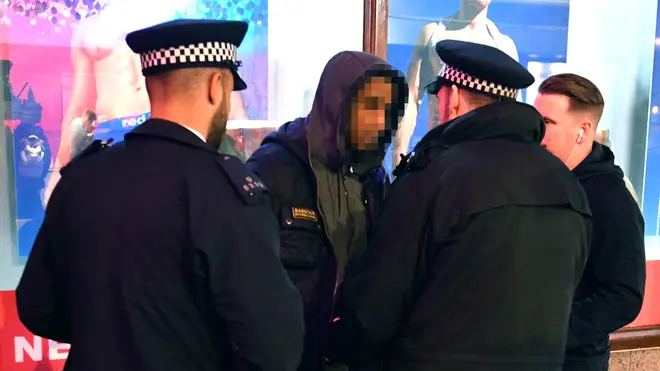
Ian Payne 4am - 7am
27 October 2020, 11:44 | Updated: 27 October 2020, 11:47

Black people are nearly nine times more likely to face stop-and-search by police than white people, official figures show.
It is a slight drop from 9.5 on the previous year, but the Home Office said searches of all black and ethnic minority groups were still four times higher than those of white people.
The Metropolitan Police alone accounts for half the total increase in stops and searches in 2019-20, while large rises were also seen in Merseyside, Essex and South Yorkshire.
Individuals from a Black, Asian and minority ethnic background are overall 4.1 times more likely to be stopped than white people. This is similar to the previous year when the rate was 4.3 times higher.
There were 558,973 stop and searches carried out in the year to March under section one of the Police and Criminal Evidence Act 1984 (Pace) in England and Wales, according to the Home Office figures. The powers allow police to search people and vehicles without a warrant.
This is the highest number of stops and searches since 2013/14 (872,518), but still below the peak in 2010/11 (1,179,746), the report said.
It is also an increase of 193,419 (53%) compared to the 2018/19, when 365,554 searches were recorded.
The report added: "The Metropolitan Police service accounts for half of the increase in the number of stops and searches in latest year."
Of the 558,973, 73,423 led to an arrest, up 28% from the previous year (57,546).
The statistics cover all stop and search powers which police have under Pace, the Criminal Justice and Public Order Act 1994 and the Terrorism Act 2000.
According to the figures, there were a further 18,081 stops and searches carried out under section 60 of the Criminal Justice and Public Order Act (known as an s60) in anticipation of violence - an increase of 35% compared with the previous year (13,414).
Last year the Home Office rolled back restrictions on the s60 tactic as part of a bid to crack down on knife crime and violence, which some critics branded "controversial".
The powers, which can be in force for up to 48 hours, give police the right to search people in a defined area during a specific time period when they believe serious violence will occur.
Officers can look for weapons before they can be used, or those used in a recent attack and do not need "serious grounds for suspicion if serious violence is anticipated", only a reasonable belief that a disturbance "may" occur.
The majority of stop and searches under both Pace and s60 powers (76% or 437,139 out of 577,054) resulted in no further action being taken, a similar proportion to the previous year (73%).
People from black, Asian and minority ethnic backgrounds were stopped at a rate of 4.1 times higher than those who were white, a similar rate to the previous year (4.3), the report added.
Data from Greater Manchester Police is not included because the force is still unable to provide figures due to ongoing technology problems.